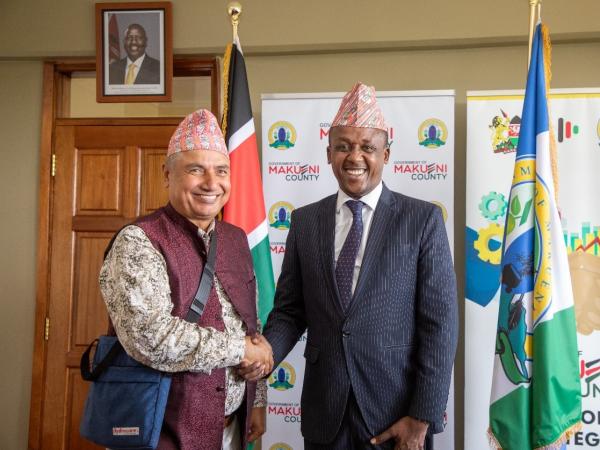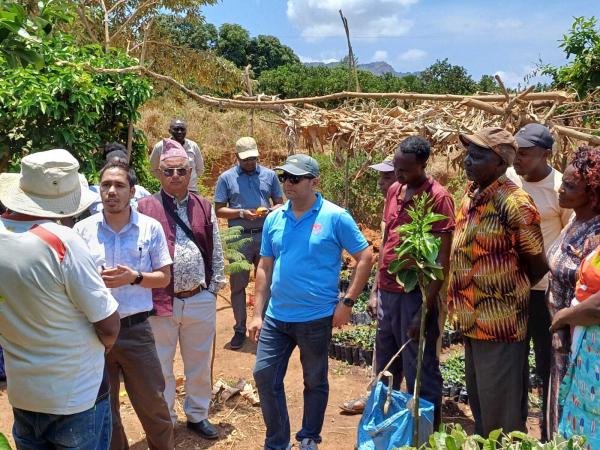Devolving climate finance: Lessons from a Kenya-Nepal peer exchange on locally-led adaptation
Devolving climate finance: Lessons from a Kenya-Nepal peer exchange on locally-led adaptation
Climate vulnerability in Nepal and Kenya
Due to a combination of social, economic and environmental factors, both Kenya and Nepal are highly vulnerable to climate change and its associated impacts. Climate change affects key sectors such as agriculture, water, biodiversity and public health. In response, both countries have enacted legal and regulatory frameworks and are working with domestic and international stakeholders to achieve their climate action objectives. While efforts are underway in both countries to enhance climate resilience through local adaptation planning and implementation, there remains a significant gap in access to finance. Accordingly, a valuable opportunity arose between the two countries for collaboration and knowledge exchange on devolved climate finance.
Addressing climate finance gaps in Nepal
Under CDKN phase 3, CDKN Asia is providing technical assistance to two municipalities of Nepal, Dhulikhel and Karjanha. This support has aided the development of the Local Adaptation Plan for Action (LAPA) with the goal of strengthening the resilience of communities and governments to respond to a changing climate. During the development of LAPA, CDKN Asia identified a pressing need to enhance the capacity of Nepalese municipalities to access and manage climate finance for inclusive adaptation initiatives.
Local urban governments in Nepal play a critical role in planning, implementing, and monitoring climate adaptation and resilience-strengthening initiatives at the grassroots level. This includes protecting vulnerable groups, including the women, elderly, children and marginalised groups from the effects of climate change. Despite the critical role of local bodies in dealing with climate change, mobilising climate finance remains a significant challenge for local governments of Nepal, as they are currently not entitled to directly access international funding sources. The national government either implements the project by itself or diverts funds to local governments. Typically, at the provincial and municipal levels, funding for climate action comes from federal fiscal transfers.
Over the past six years, climate-related funding has increased from USD 3.2 billion in financial year 2017/18 to USD 5.2 billion in financial year 2022/23. Despite this growth, the share of the directly relevant budget, critical for implementing the Local Adaptation Plan for Action (LAPA), has remained stagnant at 17%. This highlights a gap between available funding and the targeted needs of local adaptation efforts like LAPAs, which have limited support from the private sector.
Several related challenges persist:
-
Local governments often lack the experience and capacity required to effectively engage in public–private partnerships.
-
There is limited capacity to navigate complex funding mechanisms.
-
The lack of localised climate risk and vulnerability data further hinders effective climate planning at the local level.
-
Due to patriarchal norms and weak enforcement of social inclusion policies, groups facing marginalisation are often not included in planning, decision making, implementation and financing on climate adaptation initiatives.
Kenya’s Country Climate Change Fund and Financing Locally-Led Climate Actions model in action
Kenya’s experience with County Climate Change Funds (CCCF) offers valuable lessons on devolved climate financing as it is one of the pillars of the Financing Locally-Led Climate Actions (FLLoCA) programme. Kenya has successfully developed a devolved climate finance system where county-managed funds are used to finance locally prioritised climate actions. These funds are being operated on principles of locally-led adaptation (LLA), allowing government and communities to come together to plan and implement climate adaptation initiatives. The CCCF has been scaled out to all of Kenya's 47 counties, reflecting its success in the initial five pilot counties (Isiolo, Wajir, Garissa, Makueni, and Kitui). The CCCFs are anchored in County Climate Change Acts/Policies, giving them legal legitimacy and sustainability.
To improve access to climate financing for the local government, Nepal can adapt similar principles to mobilise climate finance at the grassroots level, creating provincial climate funds, strengthening participatory planning mechanisms, and aligning with national and international funding sources to meet its climate commitments.
Kenya-Nepal cross regional peer to peer exchange for fostering South-south leadership
In Kenya, the CDKN team is supporting the Ministry of Environment, Climate change and Forestry, and two counties, Makueni and Vihiga, to develop a Monitoring, Evaluation, Reporting and Learning (MERL) tool to improve the tracking and reporting of the effectiveness of climate finance invested. During the discussion with the CDKN Kenya team, it was noted that Kenya is implementing the Financing Locally Led Climate Actions (FLLoCA) model, which enables communities to take the lead in climate adaptation initiatives and facilitates their access to funding. A cross-regional peer-to-peer exchange event was organised to facilitate learning and to strengthen the collaboration between the countries. The goal was to build Global South partnerships and mobalise collective climate action, it also meant that Nepal could learn from the successes of Kenya’s FLLoCA programme.
The learning exchange was hosted in Kenya by Mr. Peter Odhengo, the Kenya National Treasury Climate Finance and Green Economy Unit Coordinator - FLLoCA; Mr. Brian Muthoka, the lead for Environment, Climate Change, and Natural Resources department at the Council of Governors (CoG); H.E. Mutula Kilonzo Junior, the Governor for Makueni County; and H.E Wavinya Ndeti, the Governor for Machakos County.

The exchange included multiple meetings and field visits, during which Nepal delegates were introduced to LLA initiatives implemented by Makueni County. The site visits in Kenya offered valuable insights to the Nepalese delegation on incorporating community voices and indigenous knowledge into climate adaptation projects, emphasising the importance of inclusivity. Given Nepal’s diverse communities and geographic challenges, adopting similar community-driven approaches could enhance climate resilience efforts
Key takeaways for Nepal delegates
The peer exchange underscored the need for targeted climate investments to advance inclusive LLA in Nepal. In this context, it highlighted the potential of developing a mechanism to provide funding directly to communities, while ensuring the support of local authorities. This would provide a good opportunity to establish a country‑specific climate fund in collaboration with national, provincial, and local governments. Such a fund would support the implementation of Local Adaptation Plans of Action (LAPAs). These LAPAs would be developed and ratified by municipalities through consultation with their communities, allowing provinces to manage Provincial Climate Change Funds that are sourced from national budgets and international donors.
The event also highlighted the need for strengthening the capacity of local governments to design and implement inclusive climate actions. The findings showed that;
-
Nepal can work on enhancing community participation in planning and monitoring adaptation projects
-
It can strengthen coordination among national, municipal, and local stakeholders.
-
Improve localised decision-making, data driven planning and inclusive adaptation approaches which are essential and effective to deal with climate change impacts.
-
It can engage local communities, especially women and other vulnerable groups, in decision-making processes. This is essential to ensure that climate investments are responsive to their specific needs and priorities.
-
The technical capacity of local governments can be strengthened to plan, implement and manage budgets for climate adaptation interventions, leading to more sustainable and impactful efforts at local level.
The exchange underscored the potential of replicating FLLoCA's participatory framework in Nepal, fostering resilience by empowering communities to play a central role in advocating for their futures in the face of climate change. Adopting similar models could significantly bolster Nepal's efforts to navigate the complexities of climate change, ensuring that solutions are rooted in local realities and collective action.

